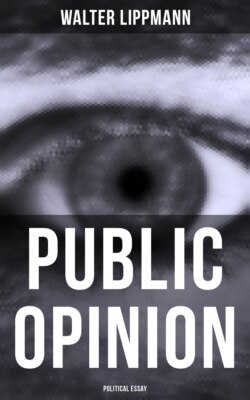Читать книгу Public Opinion: Political Essay - Walter Lippmann - Страница 28
На сайте Литреса книга снята с продажи.
4
ОглавлениеIf the comparatively simple conditions of a laboratory can so readily flatten out discrimination, what must be the effect of city life? In the laboratory the fatigue is slight enough, the distraction rather trivial. Both are balanced in measure by the subject's interest and self-consciousness. Yet if the beat of a metronome will depress intelligence, what do eight or twelve hours of noise, odor, and heat in a factory, or day upon day among chattering typewriters and telephone bells and slamming doors, do to the political judgments formed on the basis of newspapers read in street-cars and subways? Can anything be heard in the hubbub that does not shriek, or be seen in the general glare that does not flash like an electric sign? The life of the city dweller lacks solitude, silence, ease. The nights are noisy and ablaze. The people of a big city are assaulted by incessant sound, now violent and jagged, now falling into unfinished rhythms, but endless and remorseless. Under modern industrialism thought goes on in a bath of noise. If its discriminations are often flat and foolish, here at least is some small part of the reason. The sovereign people determines life and death and happiness under conditions where experience and experiment alike show thought to be most difficult. "The intolerable burden of thought" is a burden when the conditions make it burdensome. It is no burden when the conditions are favorable. It is as exhilarating to think as it is to dance, and just as natural.
Every man whose business it is to think knows that he must for part of the day create about himself a pool of silence. But in that helter-skelter which we flatter by the name of civilization, the citizen performs the perilous business of government under the worst possible conditions. A faint recognition of this truth inspires the movement for a shorter work day, for longer vacations, for light, air, order, sunlight and dignity in factories and offices. But if the intellectual quality of our life is to be improved that is only the merest beginning. So long as so many jobs are an endless and, for the worker, an aimless routine, a kind of automatism using one set of muscles in one monotonous pattern, his whole life will tend towards an automatism in which nothing is particularly to be distinguished from anything else unless it is announced with a thunderclap. So long as he is physically imprisoned in crowds by day and even by night his attention will flicker and relax. It will not hold fast and define clearly where he is the victim of all sorts of pother, in a home which needs to be ventilated of its welter of drudgery, shrieking children, raucous assertions, indigestible food, bad air, and suffocating ornament.
Occasionally perhaps we enter a building which is composed and spacious; we go to a theatre where modern stagecraft has cut away distraction, or go to sea, or into a quiet place, and we remember how cluttered, how capricious, how superfluous and clamorous is the ordinary urban life of our time. We learn to understand why our addled minds seize so little with precision, why they are caught up and tossed about in a kind of tarantella by headlines and catch-words, why so often they cannot tell things apart or discern identity in apparent differences.
